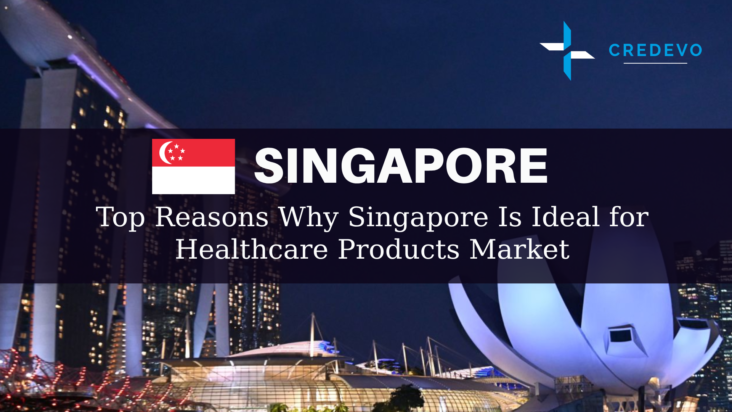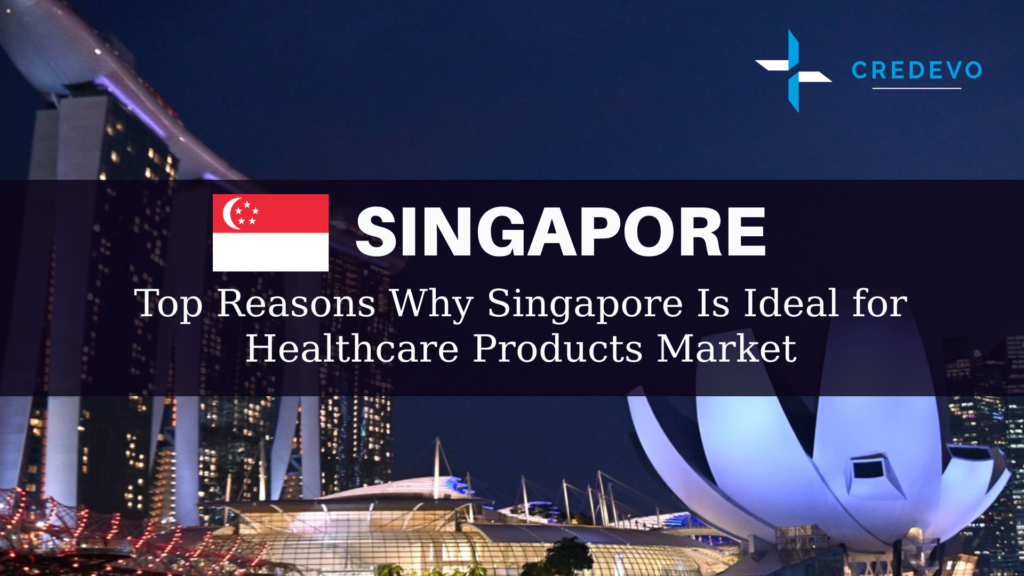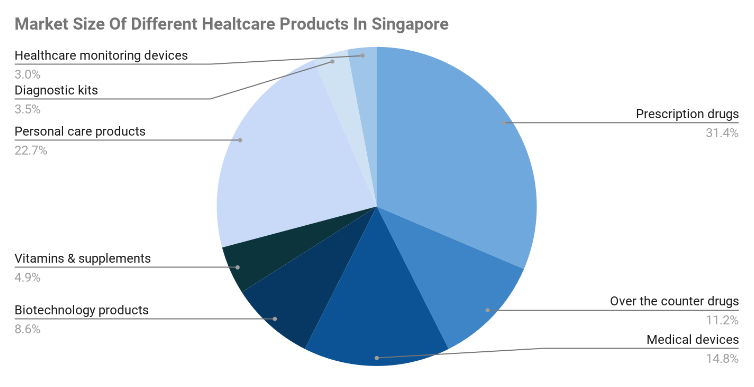Top 10 Reasons Why Singapore Is Ideal for Your Healthcare Products Market

The Singaporean healthcare and pharmaceutical market presents a lucrative opportunity for businesses aiming to expand their reach. Singapore presents a compelling opportunity for producers and distributors of healthcare products due to its sophisticated infrastructure, highly regulated industry, and dense population.

Situated at the crossroads of Asia, Singapore boasts a dynamic economy, world-class infrastructure, and a robust healthcare system. As a hub for biomedical innovation and a regional leader in healthcare excellence, Singapore offers unparalleled opportunities for companies looking to introduce their products to discerning consumers.
This comprehensive guide describes the numerous benefits of choosing Singapore as the healthcare product market.
Singapore’s market for healthcare products
The healthcare sector in Singapore is one of the best in the world, providing some of the most advanced healthcare services.
- According to market insights, the healthcare market in Singapore is expected to grow to US$49.4 billion by 2029, and healthcare spending is expected to reach nine percent of GDP by the same year.
- As of 2024, the healthcare market in Singapore continues to exhibit steady growth, driven by factors such as increasing healthcare expenditure, growing demand for innovative medical solutions, and an aging population.
- The market encompasses a range of products, including pharmaceuticals, medical devices, biotechnology products, and healthcare services.
Types of healthcare products available in Singapore
Singapore’s healthcare market offers a diverse range of products to meet the needs of its population, which values quality, innovation, and accessibility in healthcare.
Here’s an overview of the types of healthcare products available and their market size.
| Type of product | Description | Approximate market size in 2024 ($) | Expected market by 2028 ($) |
|---|---|---|---|
| Prescription drugs | These drugs need a prescription from a qualified healthcare provider. Pharmacies dispense these medications. They encompass a range of therapeutic areas, including cardiovascular health, oncology neurology, infectious diseases, and more. | USD 1.8 billion | USD 2.2 billion |
| Over-the-counter (OTC) medications | OTC medications are available without a prescription and can be purchased directly from pharmacies or retail outlets. These include common remedies for ailments such as colds and flu, allergies, pain relief, digestive issues, and skincare. OTC medications undergo regulatory scrutiny to ensure their safety and efficacy for self-medication. | USD 640 million | USD 780 million |
| Medical devices | Medical devices are essential to diagnose, treat, and keep track of medical conditions. They range from simple devices like thermometers and blood pressure monitors to more complex equipment such as imaging systems, surgical instruments, and implantable devices. | USD 850 million | USD 1.3 billion |
| Biotechnology products | Biotechnology products encompass a range of therapeutics derived from biological sources, including vaccines, monoclonal antibodies, gene therapies, and cell-based therapies. These innovative treatments offer targeted approaches for various diseases and medical conditions, driving advancements in precision medicine and personalized healthcare. | USD 490 million | USD 600 million |
| Vitamins and supplements | With a growing emphasis on preventive healthcare and wellness, vitamins and dietary supplements have become increasingly popular among Singaporean consumers. These products include vitamins, minerals, herbal supplements, probiotics, and other nutritional supplements. | USD 280 million | USD 350 million |
| Personal care products | Personal care products encompass a broad category: hygiene, grooming, and skin care, including soaps, shampoos, lotions, skin care creams, oral care products, and feminine hygiene products. Personal care products cater to individual preferences and address specific needs for maintaining cleanliness, comfort, and aesthetics. | USD 1.3 billion | USD 1.6 billion |
| Diagnostic kits | Diagnostic kits are essential for detecting and monitoring various medical conditions, including infectious diseases, genetic disorders, and chronic illnesses. These kits may utilize immunoassay molecular diagnostics, point-of-care testing, and imaging techniques to provide accurate and timely results for healthcare professionals and patients. | USD 200 million | USD 250 million |
| Health monitoring devices | With the rise of digital health and wearable technology, health monitoring devices have become increasingly prevalent in Singapore. These devices include wearable fitness trackers, smartwatches, blood glucose monitors, blood pressure monitors, and home monitoring systems for chronic conditions. Health monitoring devices empower individuals to track their health metrics, monitor trends, and make informed decisions about their well-being. | USD 170 million | USD 220 million |
The pie chart below summarizes the market size of different drug categories in Singapore in 2024.

Here are the top 10 reasons to choose Singapore as your healthcare product market
Singapore’s business-friendly environment, government support, and intellectual property protection make it an ideal destination for companies looking to establish a presence in the dynamic and growing healthcare industry.
Here are a few of the many reasons why Singapore is the best place to market your healthcare product.
- Strategic location: Singapore is a gateway to the Asia-Pacific region and offers easy access to the market. Its central location facilitates efficient distribution and logistics networks, enabling businesses to reach markets quickly and cost-effectively.
- Stable economy: The country boasts a stable and prosperous economy, providing a conducive environment for business growth.
- Advanced healthcare infrastructure: Singapore is renowned for its world-class healthcare facilities and advanced medical technology.
- High-quality standards: The healthcare industry in Singapore adheres to stringent quality standards and regulations, ensuring product safety and efficacy.
- Well-educated workforce: Singapore’s workforce is highly educated and skilled, offering ample opportunities for research and development.
- Government support: The Singaporean government provides various incentives and support programs to encourage investment in the healthcare sector.
- Thriving biomedical hub: Singapore has emerged as a leading biomedical hub in Asia, attracting top talent and fostering innovation.
- Strong intellectual property protection: The country offers robust intellectual property laws. It safeguards innovations and investments.
- Multicultural society: The multicultural society in Singapore provides a diverse consumer base, allowing for tailored marketing strategies.
- Favorable regulatory environment: Singapore’s transparent and efficient regulatory framework facilitates product registration and market entry.
The regulatory landscape for health Products in Singapore
The regulatory landscape for health products in Singapore is governed by various authorities, including the Health Sciences Authority (HSA) and the Ministry of Health (MOH).
These regulatory bodies oversee the approval, registration, and marketing of pharmaceuticals, medical devices, and other healthcare products, ensuring compliance with safety, quality, and efficacy standards.
Click here for further guidance on healthcare products and market processes in Singapore.
Challenges in marketing a drug in Singapore
Despite its many advantages, marketing pharmaceutical products in Singapore poses some challenges. Let’s discuss some challenges in marketing a healthcare product in Singapore.
- Competition: The market is highly competitive, with numerous local and international players vying for market share.
- Regulatory hurdles: Navigating the regulatory requirements can be complex and time-consuming, requiring careful planning and documentation.
- Price sensitivity: Singaporean consumers are price-conscious, making pricing strategies a key consideration for market penetration.
- Market access: Accessing key distribution channels and healthcare providers may require strategic partnerships and negotiations.
- Cultural differences: Understanding and addressing cultural nuances and preferences is essential for effective marketing campaigns.
Ways to overcome these challenges
To overcome the challenges in marketing pharmaceutical products in Singapore, companies can adopt several strategies:
- Thorough market research: Conduct comprehensive market research to understand consumer needs, preferences, and dynamics.
- Strategic pricing: Develop strategies that balance affordability with profitability, considering value proposition and competition.
- Regulatory compliance: Work closely with regulatory authorities to ensure timely approval and compliance with regulatory requirements.
- Partnerships: Forge partnerships with local distributors, healthcare providers, and key stakeholders to enhance market access and distribution channels.
- Customized marketing: Tailor marketing campaigns to resonate with the local audience, taking into account cultural sensitivities and preferences.
Conclusion
In conclusion, Singapore offers a compelling market opportunity for healthcare and pharmaceutical products, thanks to its strategic location, advanced infrastructure, supportive regulatory environment, and affluent consumer base.
By understanding the market dynamics, overcoming regulatory challenges, and adopting tailored marketing strategies, businesses can successfully navigate and capitalize on the opportunities in the Singaporean healthcare market.
Do You Have Any Further Questions Regarding Entering The Singaporean Market With Your Healthcare Products?
Do you have any questions or need support in bringing your healthcare products into the Singaporean market? Fill out the form below to reach our expert team. Credevo offers a wide range of healthcare and pharmaceutical product development and regulatory services in Singapore.